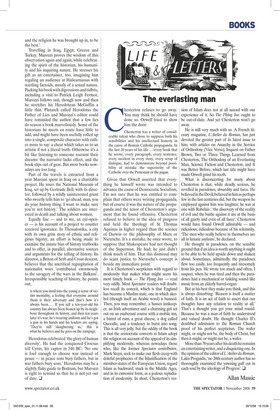The everlasting man
Chesterton refuses to go away. You may think he should have done so. Orwell tried to show him the door: Chesterton was a writer of considerable talent who chose to suppress both his sensibilities and his intellectual honesty in the cause of Roman Catholic propaganda. In the last 20 years of his life ... every book that he wrote, every paragraph, every sentence, every incident in every story, every scrap of dialogue, had to demonstrate beyond possibility of mistake the superiority of the Catholic over the Protestant or the pagan.
Given that Orwell asserted that everything he himself wrote was intended to advance the cause of Democratic Socialism, I’m not sure that he was entitled to complain that others were writing propaganda, but of course it was the nature of the propaganda and the tenor of Chesterton’s argument that he found offensive. Chesterton refused to believe in the idea of progress and held the theology of St Thomas Aquinas in higher regard than the science of Darwin or the philosophy of Marx or Nietzsche. It’s a mistake, he once wrote, to suppose that Shakespeare had not thought of the Superman. He had; he just didn’t think much of him. That this dismissal may do scant justice to Nietzsche’s concept is beside my immediate point.
It is Chesterton’s scepticism with regard to modernity that makes what might seem his most timely book — The Flying Inn — read very oddly. Most Spectator readers will doubtless recall its conceit, which is that England has become a Muslim state, one in which alcohol (though itself an Arabic word) is banned. Then, you may remember, a Sussex innkeeper, an Irish adventurer and a charming girl set out on an exuberant course with a mobile inn, a barrel of rum, a great cheese, a dog called Quoodle, and a tendency to burst into song. This is all very jolly, but the oddity of the book is that the aristocratic converts to Islam adopt the religion on account of the appeal of its simplifying modernity, whereas nowadays those who, like the former Spectator contributor, Mark Steyn, seek to make our flesh creep with doleful prophecies of the Islamification of the member-states of the European Union, regard Islam as backward, stuck in the Middle Ages, and in its extremist form, as a jealous repudiation of modernity. In short, Chesterton’s ver sion of Islam does not at all accord with our experience of it. So The Flying Inn ought to be out-of-date. And yet Chesterton won’t go away.
He is still very much with us. A French literary magazine, L’Atelier du Roman, has just devoted the greater part of its latest issue to him, with articles on Anarchy in the Service of Orthodoxy (Vice Versa), Inquest on Father Brown, Two or Three Things Learned from Chesterton, The Orthodoxy of an Everlasting Man, Science Fiction and Chesterton, and It was Better Before, which last title might have made Orwell grind his teeth.
What is disconcerting for many about Chesterton is that, while deadly serious, he revelled in paradoxes, absurdity and farce. He believed in the Devil, believed in him as perhaps few in the last centuries did, but the weapon he employed against him was laughter; he was at one with Rabelais : ‘the discovery of the reality of evil and the battle against it are at the basis of all gaiety and even of all farce’. Chesterton would have found Orwell admirable — and ridiculous; ridiculous because of his solemnity. ‘The men who really believe in themselves are all in lunatic asylums’, he declared.
He thought in paradoxes, on the sensible ground that if an idea is worth anything it ought to be able to be held upside down and shaken about. Sometimes, admittedly, the paradoxes flew too easily, too frequently and tiresomely from his pen. He wrote too much and often, I suspect, when he was tired and then the paradoxes had a mechanical or tinkling sound like music from an elderly barrel-organ.
But at his best they make you think, and this is always disturbing: ‘Reason is itself a matter of faith. It is an act of faith to assert that our thoughts have any relation to reality at all.’ That’s a thought you get your mind round. Because he was a man of faith he understood and valued doubt. He thought Charles II’s deathbed admission to the Roman Church proof of his perfect scepticism. The wafer might, or might not be, the body of Christ, but then it might, or might not be, a wafer.
More than 70 years after his death he remains an entertaining writer, and a disquieting one. In the opinion of the editor of L’Atelier du Roman, Lakis Proguidis, ‘no 20th-century author has so thoroughly examined the yawning gulf cut in each soul by the ideology of Progress’. ❑


































































































 Previous page
Previous page